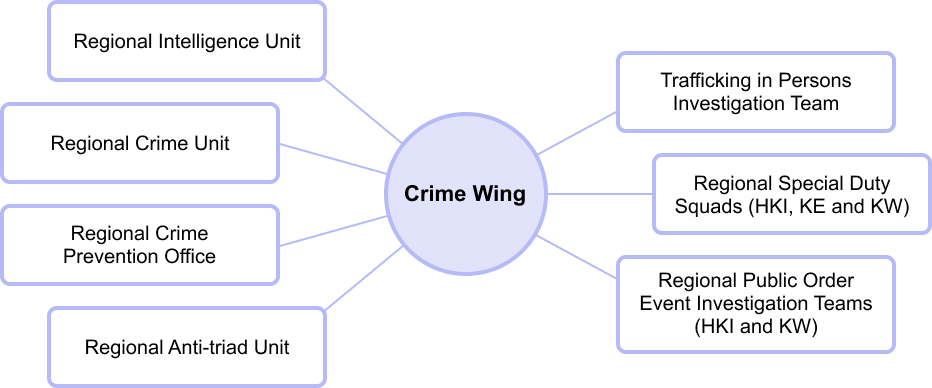Chapter 4
Investigation Log
"Intelligence gathering"? Or whistle-blowing?
In early 2016, ICAC received an anonymous letter and a phone call alleging that a Superintendent of Police might have been involved in corrupt activities. The complainant disclosed the name of the Superintendent and mentioned that someone was "having connection with a triad society" and "accepting money to assist a triad society in investigations", etc. Important it might seem, but such leads provided no details of use to an investigation.
Anonymous complaints usually provide simple and basic information or brief remarks without any concrete descriptions. Due to the one-way nature of anonymous complaints, ICAC has no way to contact the complainant for further details and it would be hard for the investigating officers to follow up the case.
The anonymous complaints made by computer-printed letter and by phone only provided the names of the Superintendent and triad society without details, making it difficult for the investigating officers to proceed further. Subsequent investigation revealed that the triad society involved in this case was different from the one named in the complaints and that created real difficulty for the investigation.
Question:Through which of the following channels can citizens report corruption to ICAC?
A. By phone
B. By letter
C. In person
D. All of the above
Surveillance operations had to be carried out for gathering evidence. Every single move of Superintendent Y was closely monitored by investigating officers in covert surveillance operations to unearth more leads, or at least to identify the persons involved in the case. In order not to miss out on any leads, a round the-clock operation was conducted to track down Superintendent Y's travels between his residence and the Police Headquarters. The operation continued during holidays. Investigation later suggested that something fishy was going on as Superintendent Y went on a yacht trip even in freezing cold winter! The luxurious yacht where Superintendent Y on board together with the connectors and young ladies had provided an important lead for the case. It showed a direction for the investigation though monitoring could only be performed from far without hearing what they said.
Superintendent Y and the connectors separated after arriving at the pier. Investigating officers followed the connectors and the ladies all the way to the Club in Wan Chai. Subsequent investigation revealed that the connectors were the Club Manager and the Club Deputy Manager. What did Superintendent Y have anything to do with them? Could it be a work relationship? Was Superintendent Y eliciting intelligence from them?
When conducting an investigation, law enforcement officers would gather intelligence from informers or undercover officers for analysis. Regular intelligence exchanges with the Mainland and overseas law enforcement agencies are maintained to curb serious criminal activities.
Duties of the Crime Wing where the Superintendent worked
The Crime Wing, to which Superintendent Y was attached, is mainly responsible for investigating serious and cross-district crimes, as well as gathering, consolidating and assessing intelligence on offenders and criminal activities in the police region. The Crime Wing generally comprises a Headquarters Group, a Support Group and seven Bureaux, including the Criminal Intelligence Bureau (CIB) and OCTB.
As the police force's central coordination body for criminal intelligence providing intelligence support to large operations and investigations of serious crimes, CIB works closely with OCTB and other bureaux in the Crime Wing and also supports the police formations in the eradication of organised and serious crimes and criminal activities involving triad societies.

With identified targets, investigation could proceed in a more specific direction. After weeks of covert surveillance, it was found that Superintendent Y and the Club Manager met in secluded places most of the time, such as in the Club or on a vehicle. There was no way for investigating officers to get near them. They always maintained a high degree of alertness and would heighten their vigilance in a public environment and communicate evasively.
Surveillance further confirmed the association among Superintendent Y, the Club Manager and the Club Deputy Manager. The Club was then the subject of a police investigation conducted by a subordinate of Superintendent Y and therefore the trio's association was dubious and suspicious. The Club Manager was seemingly a key figure in the case as he would always show up in meetings with Superintendent Y.
The investigating officers could finally work out the meeting patterns of the subject persons after a six-month monitoring operation. Apart from meal gatherings, the Club Manager and the Club Deputy Manager had several meetings with Superintendent Y on a vehicle parked at a quiet place in Tsuen Wan, where they had a brief conversation before separating. Instead of talking about business at the Club, they took all the trouble of going a long way to Tsuen Wan and there was no doubt that they did not want to be overheard by others. What they secretly discussed was the key to the investigation!

The carrying out of an investigation is no easy task, and the work becomes more difficult if it is made into a law enforcement officer. The investigating officer in charge of the case said that at the outset he had been well aware of the difficulty due to the web of intrigue involved. The investigation was very complicated as that involved a senior police officer and the information gathered was hard to verify.
The case was made even more difficult because of Superintendent Y's background. "He is professional after all." As a veteran detective with long years of seniority and experience, Superintendent Y was proficient in investigative techniques and familiar with legal provisions, and was very cautious to make sure no flaw was left. The investigating officer admitted that the investigation was extremely difficult.
Police Operations
ICAC's Investigation Process
SDS launched an investigation into the Club allegedly engaging in vice activities
SDS raided the Club and arrested the Club Deputy Manager and a number of staff members
Superintendent Y was posted to the Crime Hong Kong Island Regional Headquarters
SDS sought legal advice from DoJ in relation to the Club case
ICAC embarked on an investigation after receiving an anonymous complaint alleging Superintendent Y's involvement in corrupt activities
Investigating officers found that Superintendent Y boarded a yacht together with the Club Manager and the Club Deputy Manager
Pursuant to DoJ's legal advice, the Club Deputy Manager was released unconditionally. Four waiters of the Club were charged with the offence of assisting others in breach of conditions of stay and five hostesses were charged with the offence of contravening the conditions of stay
ICAC surveillance operations continued
SDS continued to investigate other complaints concerning the Club and reported to Superintendent Y
ICAC surveillance operations continued
The Club Manager got into the vehicle of Superintendent Y and stayed for about 20 minutes
Superintendent Y met with the Club Manager and the Club Deputy Manager at a restaurant
Superintendent Y met with the Club Manager and the Club Deputy Manager at a hotel
The Police received the first anonymous email complaining about a police officer might have made procedural mistakes during the investigation against the Club. As one of the email recipients, Superintendent Y advised his supervisors against the deployment of decoy operations due to a lack of resources
During a meeting with the Club Manager, Superintendent Y alerted him to an increasing number of licence inspections to be conducted and advised him of counter-measures
The Club Manager got into the vehicle of Superintendent Y and stayed for about 45 minutes
Superintendent Y got into the vehicle of the Club Manager and stayed for about 25 minutes
Superintendent Y and the Club Manager returned to Hong Kong from the Mainland of China in the same vehicle
The Police received the second anonymous email complaining about the licence inspections mounted against the Club were orchestrated acts. As one of the email recipients, Superintendent Y falsely claimed that no irregularities were found against the inspections, which were to the satisfaction of his superiors
Superintendent Y told the Club Manager in a meeting about an impending inspection instructed by his superiors at the Club on its branch opening day
The Club Manager asked his driver to make cash withdrawal and met with Superintendent Y, whom indicated that his subordinates had been told to conduct casual inspections on the Club. On the same day, all targets were arrested
Motives for divulging confidential information
After months of hard work, a new headway had finally been made in the investigation.
In November 2016, investigation found that Superintendent Y had disclosed to the Club Manager details of the complaints made against the Club and internal operational plans of the Police. When the Club Manager "enquired" Superintendent Y about the application of a liquor licence for a new private club and arrangement of on-site hostesses, Superintendent Y simply gave his "advice" without any mention of money. However, it was strongly believed that there had to be some sort of advantage involved.
Being attached to the Crime Hong Kong Island Regional Headquarters, Superintendent Y was well-informed of all police internal operations for his engagement in operational deployment and in the task of reporting the operation results. There were anonymous complaints made to the Police against the Club in November 2016 and January 2017, Superintendent Y, as one of the email recipients, told his superiors that it was not feasible to carry out undercover operations on grounds of the difficulty in manpower deployment and the already heightened alertness of the Club.
Subsequent investigation disclosed that it was just on the day following the Police had received the second anonymous complaint that Superintendent Y met with the Club Manager and told him about the complaints received by the Police against the Club. He further warned of the increasing licence inspections, and asked him to hide up the liquor and instruct the hostesses to claim as friends of the customers during the inspections. Superintendent Y also said that everything would be settled in a few months due to the lack of police resources for decoy operations.
On the "advice" of Superintendent Y who had an extensive experience in the Police, the Club was able to escape liability despite its breach of law. During the licence inspections at the Club, his subordinates were told to conduct the operation in a casual manner while his superiors were falsely informed that there were no discoveries.
Benefitted from his widely recognised image as an "anti-triad hero" for having smashed a number of major cases when serving OCTB, Superintendent Y should have had a promising future. However, instead of fulfilling his responsibility as a law enforcement officer, he chose to break the law by offering "professional advice" to the Club having non-compliance records. What was the reason behind?
"It should not be money that he was after." The officer in-charge found that Superintendent Y was neither in financial difficulties nor in dire need of money. The bribes involved only accounted for a very small part of his income. It is indeed beyond reason to say that he had gambled away his career for money. Having determined to join the police force since early childhood, he built up his reputation with his own efforts. It is difficult to understand the motive behind his violation of the law even when he was at his retirement age.
Superintendent Y was found to have a normal lifestyle, spending most of his time on family and work. He only attended official entertainment occasionally but often among those who left early. "There was suspicion whether other corrupt relations were involved, but nothing was revealed after thorough investigation." The people with whom Superintendent Y had official entertainment were mostly of wealth and power. Was he planning to establish interpersonal relationships for his post-retirement life?